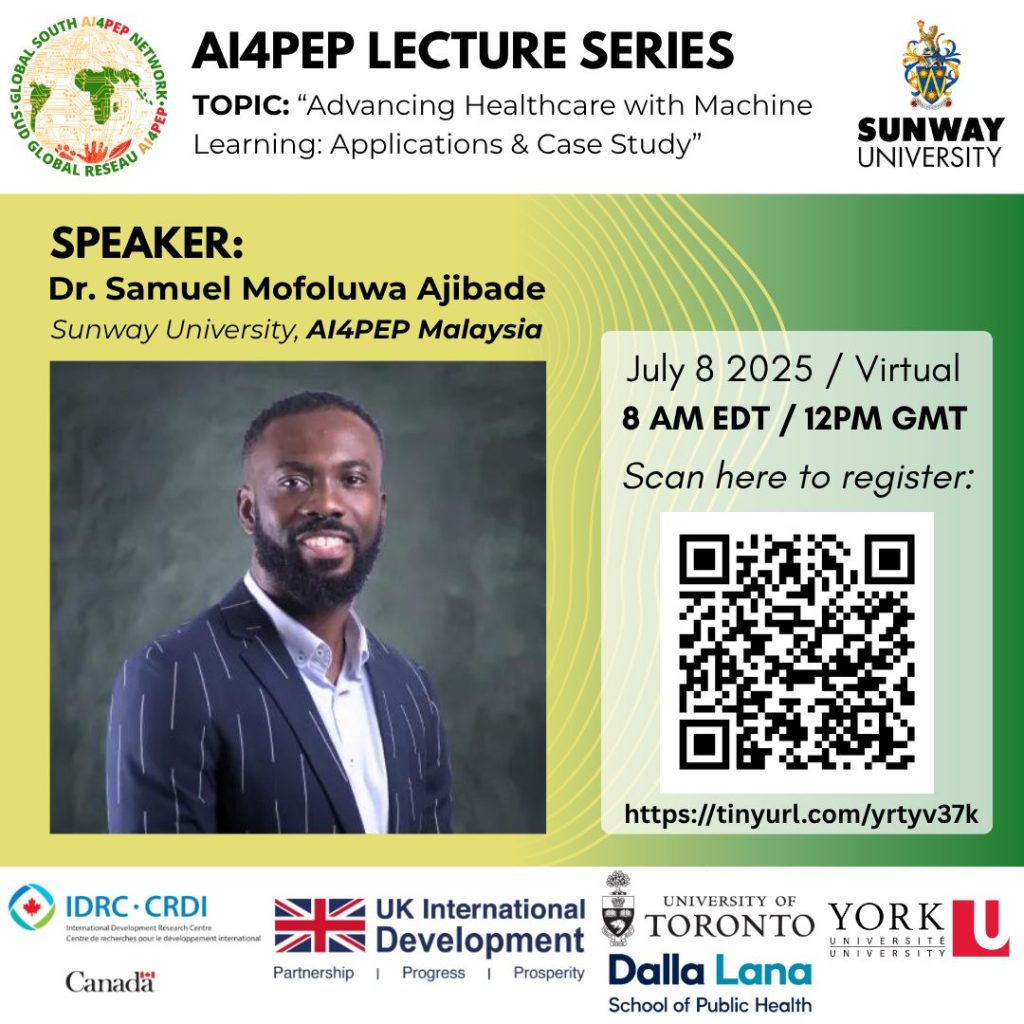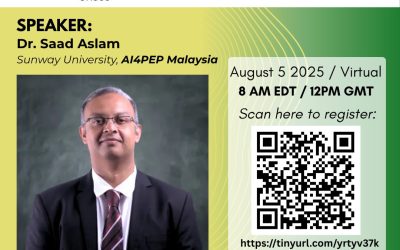
The AI4PEP Lecture Series recently hosted an insightful session titled “Advancing Healthcare with Machine Learning: Applications and Case Study,” featuring Dr. Samuel Mofoluwa Ajibade, a globally recognized computer science expert with 11 years of teaching and research experience across four continents. Currently an Assistant Professor at Istanbul Ticaret University and a research contributor with Sunway University in Malaysia, Dr. Ajibade brings a unique perspective on how artificial intelligence (AI) and machine learning (ML) can revolutionize healthcare systems.
Machine Learning’s Expanding Role in Healthcare
Dr. Ajibade began by demystifying machine learning for healthcare: a technology that allows computers to learn patterns from historical data and make decisions or predictions without explicit programming. ML’s value lies in its ability to process vast datasets efficiently and apply learned patterns to new cases, supporting healthcare providers with decision-making and improving patient outcomes.
The Power of Data and Ethical Considerations
Data underpins all ML healthcare innovations. Dr. Ajibade emphasized the importance of high-quality data collection from sources like electronic health records, wearable devices, medical images, and genetic testing. Before use, this data undergoes preprocessing, cleaning, transformation, and feature selection to ensure accuracy.
However, the integration of ML comes with challenges:
- Data privacy and security to prevent breaches and protect patient confidentiality.
- Interpretability issues when integrating AI with existing hospital systems.
- Data quality concerns, such as incomplete or biased datasets, which can skew outcomes.
- Ethical concerns including algorithmic bias, fairness, and the need for transparency and accountability.
Dr. Ajibade highlighted the rising demand for health analysts, specialists trained in ML and programming languages like Python and R, to bridge the gap between AI systems and medical professionals.
Case Study: Predicting Diabetes with Supervised Machine Learning
A focal point of the session was Dr. Ajibade’s research on diabetes prediction using ML. The study analyzed a dataset from the 2015 Behavioral Risk Factor Surveillance System, collected by the CDC in the United States, to identify the most effective supervised ML methods for accurate early detection.
Key methods included:
- Base models: Naïve Bayes (NB), K-Nearest Neighbors (KNN), Support Vector Machines (SVM), and Decision Trees (DT).
- Ensemble techniques: Bagging and boosting to enhance accuracy and reduce biases and variances.
The results revealed Random Forest (bagging) achieved an accuracy of 91.9%, while Gradient Boosting (boosting)emerged as the top performer overall, demonstrating the effectiveness of ensemble approaches in improving diagnostic precision.
Future Directions in AI for Healthcare
Dr. Ajib outlined emerging trends shaping the future:
- Integration of AI with robotic systems to advance surgical precision and patient care.
- Smart health systems enabling real-time remote patient monitoring, especially in rural or underserved regions.
- Collaborations between universities and industries to drive AI-driven healthcare innovation, as seen in AI4PEP Malaysia’s partnerships with Sunway Medical Center, the Ministry of Health Malaysia, and Canadian funder IDRC.
During the Q&A, participants raised concerns about AI replacing healthcare workers, citing studies where AI outperformed radiologists in diagnostic accuracy by 94%. Dr. Ajibade reassured attendees that while AI may reduce workforce size in certain roles, it is best viewed as a tool to help professionals,
“You know now is the time to even see AI as a tool that helps you to work and think smarter.” – Dr. Samuel Ajibade
Questions on how to secure informed consent from Indigenous or underexposed communities for AI-based health projects were equally raised and Dr. Ajibade stressed the importance of demonstrations and simplified education to build trust, emphasizing that transparency and inclusivity must remain central in AI adoption.
This lecture underscored AI4PEP’s commitment to responsible AI in healthcare, promoting solutions that enhance diagnosis, treatment, and system efficiency while safeguarding ethics, and human roles. Through case studies and open dialogue, Dr. Ajibade’s session showcased how machine learning is not just reshaping healthcare but also fostering a collaborative future for global health equity.
You can watch the full session on our Youtube channel:


